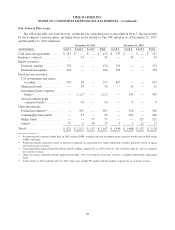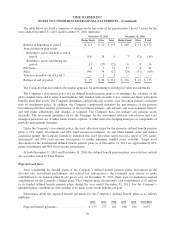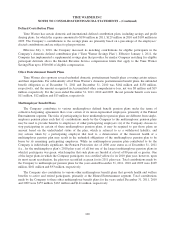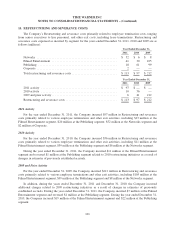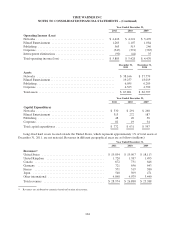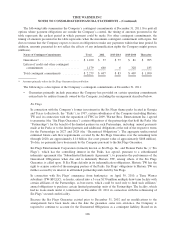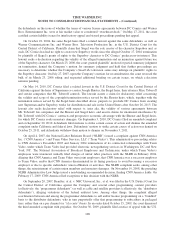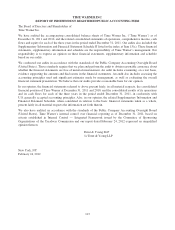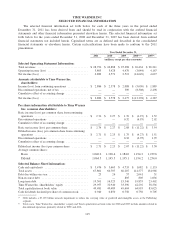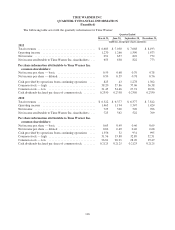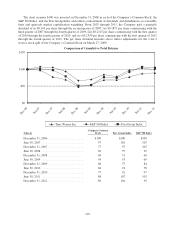Time Magazine 2011 Annual Report Download - page 122
Download and view the complete annual report
Please find page 122 of the 2011 Time Magazine annual report below. You can navigate through the pages in the report by either clicking on the pages listed below, or by using the keyword search tool below to find specific information within the annual report.TIME WARNER INC.
NOTES TO CONSOLIDATED FINANCIAL STATEMENTS – (Continued)
the defendants on the issue of whether the terms of various license agreements between DC Comics and Warner
Bros. Entertainment Inc. were at fair market value or constituted “sweetheart deals.” On May 17, 2011, the court
certified certain liability issues for interlocutory appeal and stayed proceedings pending that appeal.
On October 22, 2004, the same Siegel heirs filed a related lawsuit against the same defendants, as well as
Warner Communications Inc. and Warner Bros. Television Production Inc. in the U.S. District Court for the
Central District of California. Plaintiffs claim that Siegel was the sole creator of the character Superboy and, as
such, DC Comics has had no right to create new Superboy works since the alleged October 17, 2004 termination
by plaintiffs of Siegel’s grants of rights to the Superboy character to DC Comics’ predecessor-in-interest. This
lawsuit seeks a declaration regarding the validity of the alleged termination and an injunction against future use
of the Superboy character. On March 23, 2006, the court granted plaintiffs’ motion for partial summary judgment
on termination, denied the Company’s motion for summary judgment and held that further proceedings are
necessary to determine whether the Company’s Smallville television series may infringe on plaintiffs’ rights to
the Superboy character. On July 27, 2007, upon the Company’s motion for reconsideration, the court reversed the
bulk of its March 23, 2006 ruling, and requested additional briefing on certain issues, on which a decision
remains pending.
On May 14, 2010, DC Comics filed a related lawsuit in the U.S. District Court for the Central District of
California against the heirs of Superman co-creator Joseph Shuster, the Siegel heirs, their attorney Marc Toberoff
and certain companies that Mr. Toberoff controls. The lawsuit asserts a claim for declaratory relief concerning
the validity and scope of the copyright termination notice served by the Shuster heirs, which, together with the
termination notices served by the Siegel heirs described above, purports to preclude DC Comics from creating
new Superman and/or Superboy works for distribution and sale in the United States after October 26, 2013. The
lawsuit also seeks declaratory relief with respect to, inter alia, the validity of various agreements between
Mr. Toberoff, his companies and the Shuster and Siegel heirs, and asserts claims for intentional interference by
Mr. Toberoff with DC Comics’ contracts and prospective economic advantage with the Shuster and Siegel heirs,
for which DC Comics seeks monetary damages. On September 3, 2010, DC Comics filed an amended complaint
and on September 20, 2010, defendants filed motions to strike certain causes of action and dismiss the amended
complaint under California and federal laws. Defendants’ motion to strike certain causes of action was denied on
October 25, 2011, and defendants withdrew their motion to dismiss on November 3, 2011.
On April 4, 2007, the National Labor Relations Board (“NLRB”) issued a complaint against CNN America
Inc. (“CNN America”) and Team Video Services, LLC (“Team Video”). This administrative proceeding relates
to CNN America’s December 2003 and January 2004 terminations of its contractual relationships with Team
Video, under which Team Video had provided electronic newsgathering services in Washington, DC and New
York, NY. The National Association of Broadcast Employees and Technicians, under which Team Video’s
employees were unionized, initially filed charges of unfair labor practices with the NLRB in February 2004,
alleging that CNN America and Team Video were joint employers, that CNN America was a successor employer
to Team Video, and/or that CNN America discriminated in its hiring practices to avoid becoming a successor
employer or due to specific individuals’ union affiliation or activities. The NLRB complaint seeks, among other
things, the reinstatement of certain union members and monetary damages. On November 19, 2008, the presiding
NLRB Administrative Law Judge issued a non-binding recommended decision, finding CNN America liable. On
February 17, 2009, CNN America filed exceptions to this decision with the NLRB.
On September 20, 2007, Brantley, et al. v. NBC Universal, Inc., et al. was filed in the U.S. District Court for
the Central District of California against the Company and several other programming content providers
(collectively, the “programmer defendants”) as well as cable and satellite providers (collectively, the “distributor
defendants”), alleging violations of the federal antitrust laws. Among other things, the complaint alleged
coordination between and among the programmer defendants to sell and/or license programming on a “bundled”
basis to the distributor defendants, who in turn purportedly offer that programming to subscribers in packaged
tiers, rather than on a per channel (or “à la carte”) basis. In an order dated October 15, 2009, the court dismissed
the third amended complaint with prejudice. On October 30, 2009, plaintiffs filed a notice of appeal with the U.S.
108


